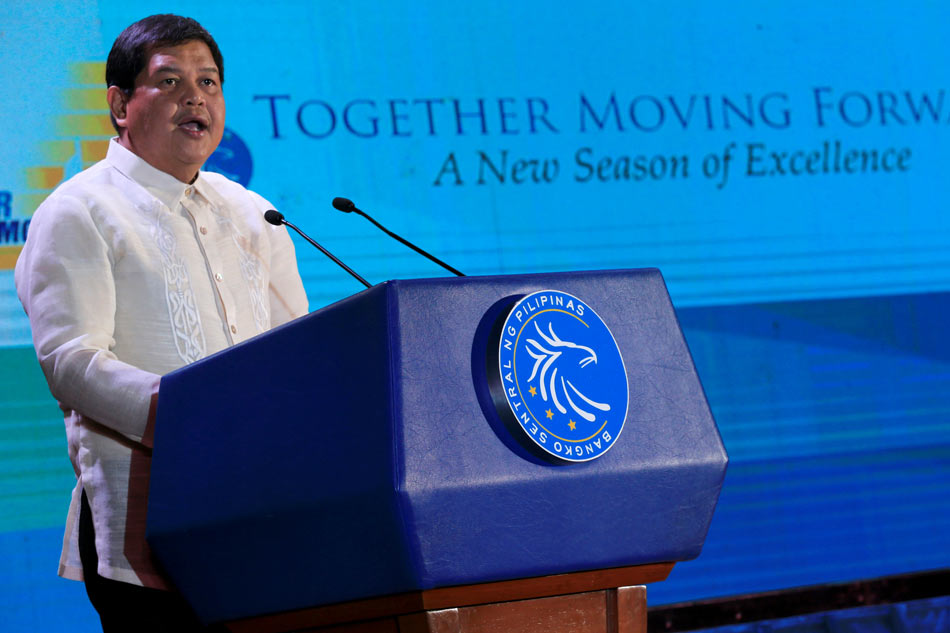Espenilla: Philippines needs to prepare for end of global easy money | ABS-CBN
ADVERTISEMENT

Welcome, Kapamilya! We use cookies to improve your browsing experience. Continuing to use this site means you agree to our use of cookies. Tell me more!
Espenilla: Philippines needs to prepare for end of global easy money
Espenilla: Philippines needs to prepare for end of global easy money
Reuters
Published Jul 03, 2017 04:50 PM PHT
|
Updated Jul 03, 2017 10:03 PM PHT
MANILA - Bangko Sentral ng Pilipinas Governor Nestor Espenilla warned of the potentially "far-reaching" impact of advanced economies' exits from their accommodative monetary policies, on his first day as the head of the bank.
MANILA - Bangko Sentral ng Pilipinas Governor Nestor Espenilla warned of the potentially "far-reaching" impact of advanced economies' exits from their accommodative monetary policies, on his first day as the head of the bank.
Espenilla, who previously headed banking supervision in the Philippines, began his 6-year term as President Rodrigo Duterte's administration prepares for a 6-year, $180 billion spending spree on infrastructure, in a bid to sustain galloping growth.
Espenilla, who previously headed banking supervision in the Philippines, began his 6-year term as President Rodrigo Duterte's administration prepares for a 6-year, $180 billion spending spree on infrastructure, in a bid to sustain galloping growth.
While the country's growth prospects remain positive, Espenilla said the central bank needed to be mindful of potential vulnerabilities to ensure the economy remains on solid ground.
While the country's growth prospects remain positive, Espenilla said the central bank needed to be mindful of potential vulnerabilities to ensure the economy remains on solid ground.
"We have to be prepared for the seemingly imminent wind-down of ultra-easy monetary policies in advanced economies," said Espenilla, who took over from the well-respected Amando Tetangco after a 12-year tenure.
"We have to be prepared for the seemingly imminent wind-down of ultra-easy monetary policies in advanced economies," said Espenilla, who took over from the well-respected Amando Tetangco after a 12-year tenure.
ADVERTISEMENT
The US Federal Reserve has been raising rates and is looking to start reducing its massive balance sheet. At the same time the European Central Bank and even the Bank of Japan are cautiously looking to the end of monetary easing.
The US Federal Reserve has been raising rates and is looking to start reducing its massive balance sheet. At the same time the European Central Bank and even the Bank of Japan are cautiously looking to the end of monetary easing.
Global markets took fright at the Federal Reserve's first hint that it might taper its monetary expansion policy in 2013. That so-called taper tantrum sent bond yields up sharply and sowed turmoil in world markets from Rio de Janeiro to Jakarta.
Global markets took fright at the Federal Reserve's first hint that it might taper its monetary expansion policy in 2013. That so-called taper tantrum sent bond yields up sharply and sowed turmoil in world markets from Rio de Janeiro to Jakarta.
"We need to be mindful of such events and their potentially far-reaching consequences since these could undermine our economic performance and disrupt our carefully-laid plans," Espenilla said in a speech.
"We need to be mindful of such events and their potentially far-reaching consequences since these could undermine our economic performance and disrupt our carefully-laid plans," Espenilla said in a speech.
The Philippines, which has enjoyed 73 quarters of uninterrupted growth, continues to enjoy manageable inflation, that has allowed policymakers to leave policy settings unchanged since a 25 basis-point hike in rates in September 2014.
The Philippines, which has enjoyed 73 quarters of uninterrupted growth, continues to enjoy manageable inflation, that has allowed policymakers to leave policy settings unchanged since a 25 basis-point hike in rates in September 2014.
Espenilla said the central bank would continue to "fine-tune" its monetary policy to make it "more market-oriented", which would entail a constant review of policy tools, including banks' reserve requirements and the interest rate corridor.
Espenilla said the central bank would continue to "fine-tune" its monetary policy to make it "more market-oriented", which would entail a constant review of policy tools, including banks' reserve requirements and the interest rate corridor.
He added banks' current required reserves, currently at 20 percent, would have to be lowered eventually, but that this would not happen immediately.
He added banks' current required reserves, currently at 20 percent, would have to be lowered eventually, but that this would not happen immediately.
"We need to find a path to lower the reserve requirement without compromising on price stability," he said.
"We need to find a path to lower the reserve requirement without compromising on price stability," he said.
"Remember, when we built up the reserves, this was largely during the time of the global financial crisis. So that's the flip side of the global financial crisis... There will come a time when we need to manage that as well and reduce the size of the balance sheet of the BSP," Espenilla said.
"Remember, when we built up the reserves, this was largely during the time of the global financial crisis. So that's the flip side of the global financial crisis... There will come a time when we need to manage that as well and reduce the size of the balance sheet of the BSP," Espenilla said.
The Bangko Sentral ng Pilipinas' first policy meeting under Espenilla will be on Aug. 10.
The Bangko Sentral ng Pilipinas' first policy meeting under Espenilla will be on Aug. 10.
He pledged to work with other agencies to develop the debt market to support the infrastructure plan.
He pledged to work with other agencies to develop the debt market to support the infrastructure plan.
The 58-year old career central banker also promised greater access to financial services to ensure the benefits of growth are broadly felt.
The 58-year old career central banker also promised greater access to financial services to ensure the benefits of growth are broadly felt.
ADVERTISEMENT
ADVERTISEMENT


